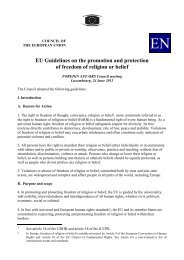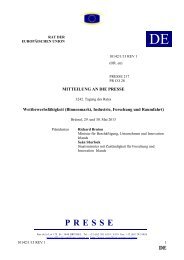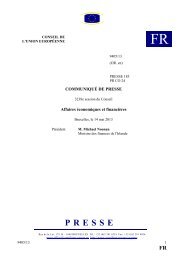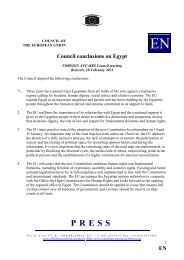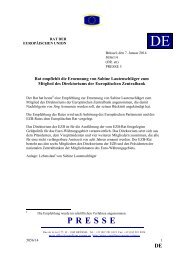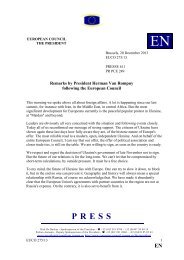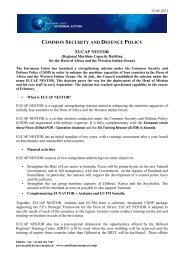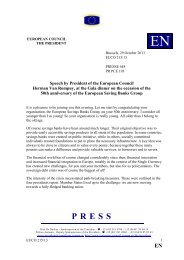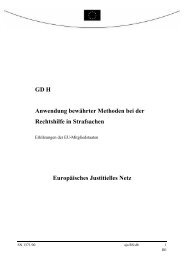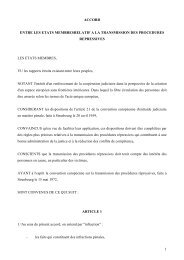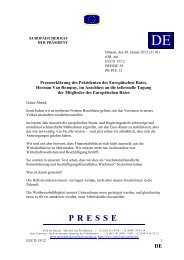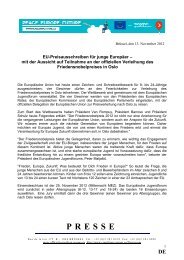14508/09 ADD 1 PL/vk 1 DG G COUNCIL OF THE ... - Europa
14508/09 ADD 1 PL/vk 1 DG G COUNCIL OF THE ... - Europa
14508/09 ADD 1 PL/vk 1 DG G COUNCIL OF THE ... - Europa
Create successful ePaper yourself
Turn your PDF publications into a flip-book with our unique Google optimized e-Paper software.
All Member States also have some form of action plan for gender equality, although there are still<br />
eight countries (AU, EE, DE, GR, IT, HU, MT and <strong>PL</strong>) that lack an overall policy document for the<br />
national gender equality policies. Cyprus and Luxemburg have since 2006 launched their first<br />
comprehensive action plans on gender equality. Most action plans deal with a broad range of<br />
questions but issues concerning education, employment, decision-making, social rights and violence<br />
against women are priorities for most Member States.<br />
A majority of the Member States have a Cabinet Minister who is responsible for gender equality<br />
issues but Greece, Poland and Slovenia do not have a Minister responsible for this policy area and<br />
in several Member States the responsible Minister does not have “gender equality” or “women” in<br />
the title (c.f. IE). 21 In some Member States this task is framed in terms of Women’s Rights, i.e. a<br />
Minister for Women’s Rights or a Minister for Women and Equality (c.f. UK). There is no Member<br />
State where the Cabinet Minister only has gender equality/women’s rights as her or his<br />
responsibility. The portfolio is most often combined with a responsibility for family, social justice<br />
and labour market questions.<br />
All Member States have legislation that addresses the importance of the equal value of all citizens<br />
and non-discrimination laws, and in addition to this they have an independent body for the<br />
protection of equal treatment. There is an increasing tendency for this independent body to handle<br />
protection against discrimination on several grounds, not only on the grounds of sex. In the 2006<br />
report from the Finnish Presidency there was the same number of Member States that had an<br />
independent body for protection against discrimination on the grounds of sex as for discrimination<br />
on several grounds; 11 Member States. Today 16 of the Member States have implemented a<br />
multiple discrimination approach, i.e. have non-discrimination laws on several grounds and an<br />
independent body for protection against discrimination on several grounds.<br />
The Nordic countries Denmark, Finland and Sweden have since 2006 launched bodies for the<br />
protection against multiple discrimination, as well as Belgium, Estonia, Luxembourg, the<br />
Netherlands and Poland. Other Member States has launched new laws on gender equality since<br />
2005 (HU, UK) and there are also Member States that have an act which enforces gender<br />
mainstreaming (BG, DE, DK, EE, FI, ES, HU, SI and UK), see section 3.3.3.<br />
21 Information on the responsible Minister has been very scarce in several of the UNECE<br />
reports.<br />
<strong>14508</strong>/<strong>09</strong> <strong>ADD</strong> 1 <strong>PL</strong>/<strong>vk</strong> 39<br />
ANNEX <strong>DG</strong> G EN



